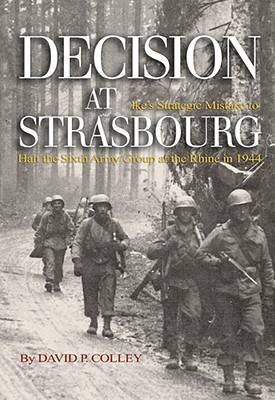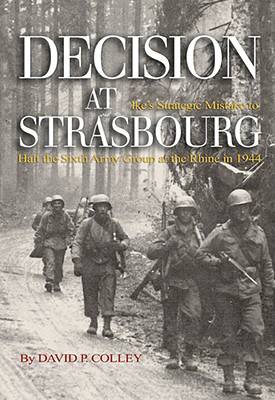
Wil je zeker zijn dat je cadeautjes op tijd onder de kerstboom liggen? Onze winkels ontvangen jou met open armen. Nu met extra openingsuren op zondag!
- Afhalen na 1 uur in een winkel met voorraad
- Gratis thuislevering in België vanaf € 30
- Ruim aanbod met 7 miljoen producten
Wil je zeker zijn dat je cadeautjes op tijd onder de kerstboom liggen? Onze winkels ontvangen jou met open armen. Nu met extra openingsuren op zondag!
- Afhalen na 1 uur in een winkel met voorraad
- Gratis thuislevering in België vanaf € 30
- Ruim aanbod met 7 miljoen producten
Zoeken
Decision at Strasbourg
Ike's Strategic Mistake to Halt the Sixth Army Group at the Rhine in 1944
David P Colley
€ 57,45
+ 114 punten
Omschrijving
Decision at Strasbourg relates the remarkable and largely unknown story of Lt. General Jacob Devers' lost opportunity to launch a bold attack into the heart of Nazi Germany, which may have won the European war in late 1944, six months before Victory-over-Europe (V-E) Day in May 1945. Devers' Sixth Army Group, comprising the U.S. Seventh and First French Armies, made successful amphibious landings near Marseille in August 1944 and advanced 450 miles through southern France before reaching the banks of the Rhine in Alsace on 24 November 1944. Once on the Rhine, Devers' was presented with an unexpected strategic opportunity to cross the river and advance into Germany, where the Group could seal off the German 19th Army in Alsace and maneuver behind the German 1st Army, fighting General George S. Patton's Third Army in Lorraine. Devers hoped this bold maneuver would collapse the southern enemy front opposite the U.S. Seventh and Third Armies and possibly lead to the disintegration of the entire enemy front, from Switzerland to the Netherlands, bringing about a swift end to the war in Europe. The Rhine was the principal objective of the allied armies fighting in France. Allied generals realized its strategic importance, as did German generals, who understood that if Allied forces crossed the Rhine, Germany was doomed. Devers never breached the Rhine in 1944. The Supreme Allied Commander, General Dwight Eisenhower, ordered Dever's planned assault halted a day before it was to proceed. Ike's decision to forego this opportunity meant that the allies would not cross the Rhine until March 1945.To date, historians have not explained fully why Eisenhower stopped Devers, who was deeply angered by the order; nor have they analyzed the possible outcome of such an attack. Decision at Strasbourg does just this, exploring what might have occurred had Ike allowed Devers to cross the river. Colley judiciously cites the opinions of many high-ranking generals, including Patton, that the attack would have been a bold and likely successful maneuver that might have ended the war months earlier and saved thousands of American lives.In rolling out this alternative historical perspective, the author offers unique insight regarding Eisenhower and the Supreme Command in Europe during WWII, illuminating the potential consequences of Ike's cautious leadership and his rejection of General Devers and his strategy, largely because of his dislike and lack of confidence in the Sixth Army Group commander. Colley points to Ike's reliance on old friends and colleagues, sometimes regardless of ability, and how the conduct of WWII in Europe was determined by personal amities and animosities-a worthy study for future military leaders seeking to take advantage of unique battlefield opportunities.
Specificaties
Betrokkenen
- Auteur(s):
- Uitgeverij:
Inhoud
- Aantal bladzijden:
- 280
- Taal:
- Engels
- Reeks:
Eigenschappen
- Productcode (EAN):
- 9781591141334
- Verschijningsdatum:
- 1/10/2008
- Uitvoering:
- Hardcover
- Formaat:
- Genaaid
- Afmetingen:
- 160 mm x 232 mm
- Gewicht:
- 521 g

Alleen bij Standaard Boekhandel
+ 114 punten op je klantenkaart van Standaard Boekhandel
Beoordelingen
We publiceren alleen reviews die voldoen aan de voorwaarden voor reviews. Bekijk onze voorwaarden voor reviews.











